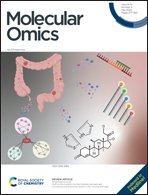The dynamic inflammatory profile of pregnancy can be monitored using a novel lipid-based mass spectrometry technique†
Abstract
The lipid environment changes throughout pregnancy both physiologically with emergent insulin resistance and pathologically e.g., gestational diabetes mellitus (GDM). Novel mass spectrometry (MS) techniques applied to minimally processed blood might lend themselves to monitoring changing lipid profiles to inform care decisions across pregnancy. In this study we use an intact-sandwich, MALDI-ToF MS method to identify phosphatidylcholine (PC) and lysophosphatidylcholine (LPC) species and calculate their ratio as an indicator of inflammation. Plasma and sera were prepared from venous blood of non-pregnant women (aged 18–40) and pregnant women at 16 weeks, 28 weeks (including GDM-positive women), and 37+ weeks (term) of gestation alongside umbilical cord blood (UCB). Women with a normal menstrual cycle and age-matched men provided finger-prick derived capillary sera at 6 time-points over a month. Serum rather than plasma was preferable for PC/LPC measurement. As pregnancy progresses, an anti-inflammatory phenotype dominates the maternal circulation, evidenced by increasing PC/LPC ratio. In contrast, the PC/LPC ratio of UCB was aligned to that of non-pregnant donors. BMI had no significant effect on the PC/LPC ratio, but GDM-complicated pregnancies had significantly lower PC/LPC at 16 weeks of gestation. To further translate the use of the PC/LPC ratio clinically, the utility of finger-prick blood was evaluated; no significant difference between capillary versus venous serum was found and we revealed the PC/LPC ratio oscillates with the menstrual cycle. Overall, we show that the PC/LPC ratio can be measured simply in human serum and has the potential to be used as a time-efficient and less invasive biomarker of (mal)adaptative inflammation.



 Please wait while we load your content...
Please wait while we load your content...